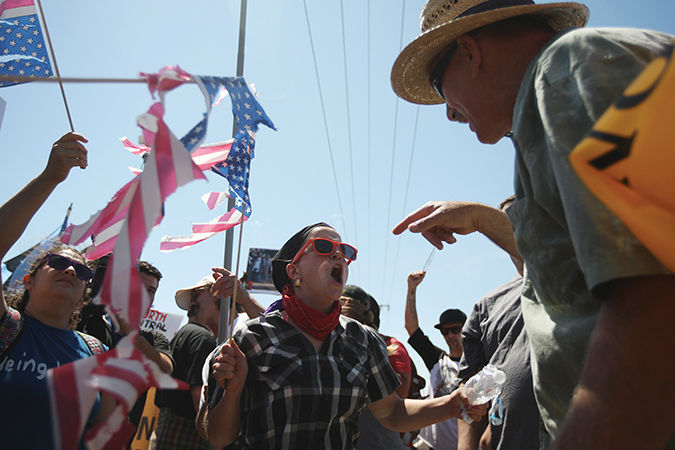The battle for comprehensive immigration reform took on a more urgent and in some cases heated tone in recent days with several rallies and assemblies drawing support and opposition.
On July 1, anti-immigrant demonstrators successfully blocked three buses transporting Central American migrants who had been detained in Texas from entering the Murrieta Border Patrol station for processing. The buses — carrying mostly women with small children believed to be fleeing crime in their homelands — were met by protesters carrying American flags and signs proclaiming “Return to sender” as they screamed “Go home” and chanted “U.S.A.” As a result, officials decided to reroute the buses to a border patrol station near the Mexican border.
On July 2, immigrant-rights activists representing the Justice for Immigrants Coalition of Inland Southern California (JFIC) held a news conference in front of the U.S. Immigration and Customs Enforcement (ICE) office in San Bernardino to denounce the “hateful” statements and activities in Murrieta, the previous day.
In a statement addressing the transport of migrants to Murrieta, Bishop Gerald Barnes of the San Bernardino Diocese — which is a member of the pro-immigrant JFIC group — described the current immigration crisis as “firstly a humanitarian issue that transcends political opinions and dispositions.”
“I ask you to reflect on how you can answer the call of the Gospel to come to [the] aid of the stranger in this situation,” he said. “Our diocese pledges to help these migrants in whatever way is most effective, and we will be asking the Catholic communities of faith in our diocese to help raise needed resources and to volunteer their time.”
Among those Catholic communities taking action is St. Martha Church in Murrieta. According to John Andrews, director of communications for the Diocese of San Bernardino, parishioners, deacons and community members have collected food, water, clothing and other items to create care packages for the migrant “children and families who are eventually going to be coming in.”
San Bernardino Auxiliary Bishop Rutilio del Riego and local representatives of Catholic Charities met with ICE officials July 2 to review various ways to help the migrants expected to arrive in the coming weeks. The current plan is to establish transitional centers to: distribute food, clothing and other essentials; provide spiritual guidance, and; help migrants get in touch with family members in the United States and offer assistance with travel costs.
“That’s kind of the central effort that the Diocese of San Bernardino has right now, to find some locations to open these centers and to find enough volunteers to man them,” Andrews told The Tidings. Although the July 1 protests succeeded in turning away the convoy of buses slated for arrival that day, groups of migrants are still expected to arrive in Murrieta in the near future, he explained.
“It’s a matter of ‘when’ not ‘if,’” said Andrews.
Said Bishop Barnes: “This [situation] also presents us with an opportunity to refocus and restate our call for comprehensive immigration reform, which would make this kind of displacement of human beings unnecessary. We are both a nation that respects the rule of law and also a nation that has been wonderfully blessed by the energy, initiative and open heart of the immigrant.”
A crowd of protesters, immigrant supporters, police and media gathered again on July 4 and July 7 outside the Murrieta station where more buses carrying detained immigrants were expected to arrive. Instead the buses traveled to a Border Patrol facility in San Ysidro in San Diego County. Federal officials did not say if the buses were redirected to San Ysidro, or had been designated to go there all along.
Murrieta has become a front line in the national debate over immigration policy, as federal officials begin to send the estimated 240,000 migrants — including 52,000 unaccompanied minors — who have crossed the border illegally in recent months in the Rio Grande Valley to cities around the country for processing. Following processing, those with relatives already living in the U.S. will likely be released and told to appear in front of an immigration judge at a later date.
In Los Angeles
Meanwhile, a July 7 rally was held at the downtown Los Angeles Federal Building, with immigrant families and children's advocates protesting President Barack Obama's statement that unaccompanied children and families illegally entering the U.S. would face deportation proceedings.
In response to the president’s statement, and to a recent federal court ruling, L.A. Mayor Eric Garcetti and the Los Angeles Police Department said the LAPD would no longer hold immigrants on a request from federal immigration authorities, and would require a judge’s order to uphold the ICE request.
In April, a federal court ruled that an Oregon county was liable for damages after holding an inmate beyond her release date so that she could be transferred to ICE. Garcetti declared that the enforcement of federal immigration law was the federal government’s responsibility.
In Port Hueneme (in Ventura Clounty), immigrant rights’ activists were scheduled to assemble July 8 (near The Tidings’ press deadline) to support immigrant children who are being temporarily housed at a Naval Base shelter. A reported 1,200 immigrant teenagers (primarily from Central America), who were apprehended illegally crossing the U.S.-Mexico border without a parent, have been housed at the converted warehouse, the Ventura County Star reported.
Later in the afternoon July 8, a group of community and religious leaders who had toured the Ventura County shelter were scheduled to hold an “interfaith call for prayer and compassion” for the child refugees. The event in downtown Los Angeles was hosted by the California Endowment, a private, statewide health foundation established to expand access to affordable, quality health care for underserved individuals and communities.
Mike Nelson contributed to this story.

